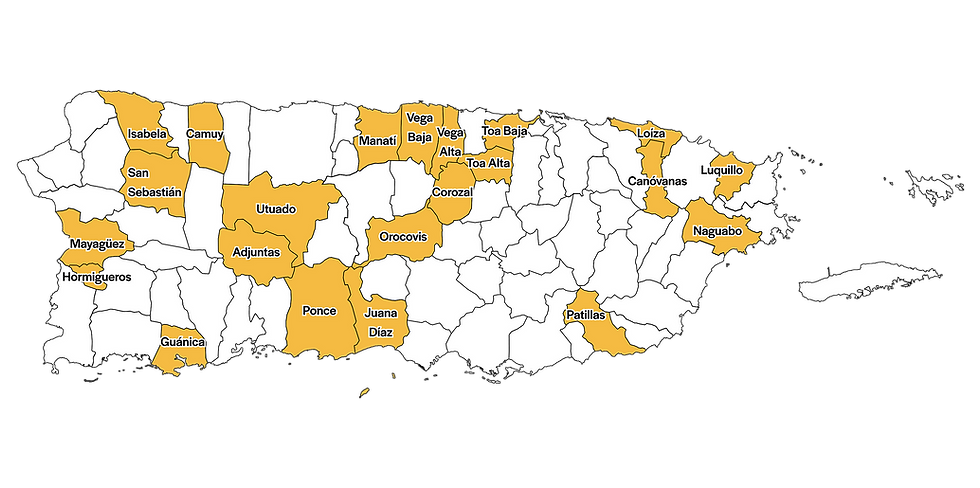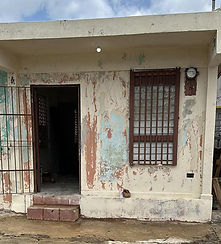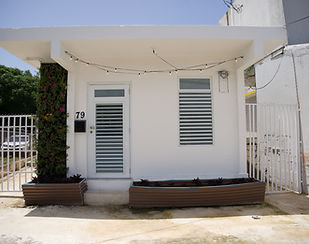

SERVICES
Through its history working hand in hand with different communities, the CRH has positioned itself as the main providers of technical assistance, consulting and expertise on the issue of property abandonment in Puerto Rico. In order to continue multiplying pilot projects that are sustainable and compatible with community development, and also to guarantee resources to continue offering its programs to the community, the CRH offers a variety of services to municipalities and non-profit entities.
MUNICIPAL SUPPORT
FOR THE DEVELOPMENT OF PUBLIC NUISANCE PROGRAMS
In recent years, Puerto Rico has legislated tools to provide municipalities and communities with the best management of their housing abandonment problem. Even so, a large part of the municipalities have not taken advantage of the legislation, whether due to lack of knowledge, economic limitations or a presumption that programs to reduce public nuisances can be slow and expensive, many municipalities lack a functional program. . Meanwhile, the housing crisis has deepened and property abandonment has increased disproportionately in vulnerable communities. For these reasons, CRH promulgates best practices to reduce costs, encourage civic participation, and create new opportunities for affordable housing, resilience, and community development.
HOW DOES CRH HELP?
The CRH offers technical assistance through grants or consulting services based on the need and preference of the municipality. Whether for a single training workshop for municipal staff, technical assistance as needed (“on call”) or to manage the nuisance reduction program, the CRH has the necessary experience to develop strategies in the fight against abandonment of properties. Additionally, CRH is a 501(c)(3) nonprofit organization, allowing it to reinvest in community initiatives.
Review legal frameworks and draft ordinances for the acquisition of public nuisances.
Identify specific projects (“placemaking”) that are viable and have high social impact.
Train staff to ensure the long-term sustainability of the program.
Facilitate citizen participation and community inventories of possible obstacles.
Support alternative tenure methods, such as Land Trusts and Community Land Banks.
COLLABORATING MUNICIPALITIES

COMMUNITY PLANNING
FOR THE DEVELOPMENT OF PUBLIC NUISANCE PROGRAMS
Although the processes of identification, declaration and acquisition of public nuisances are a power of municipal governments, the CRH also directly supports communities with technical and legal support. By providing support to resident associations and nonprofit organizations already working with residents, participatory planning efforts are made to better understand the problem of abandonment, identify opportunities for community development, and advocate for the legal structures and public policy necessary to address the problem.


COMMUNITIES AND NGOS
COLLABORATORS
STEPS
01
INVENTORY
Build street by street an inventory of unused and abandoned properties. During the process, residents identify health and safety risks.
ANALYSIS
02
Investigate the tax and legal status of each property, identifying those with the greatest potential for specific and viable projects.
03
PLANNING
Write a Community Plan through participatory processes and outlining strategies to address community needs with available assets.
04
TRAINING
Adopt the legal structures necessary to implement the Plan, such as strengthening a residents' association or creating a land trust.
ADVOCACY
05
Work on the approval of ordinances necessary for the Plan, such as creating title transfer programs and community land banks.




Psychological Legal Clinic
of the University of Puerto Rico

PROGRAMA DE ASISTENCIA LEGAL
¿Necesitas asesoría legal para hacer valer tus derechos propietarios?
El CRH pudiera ayudarte de manera gratuita. En colaboración con la Fundación Fondo de Acceso a la Justicia, estamos brindando apoyo y/o representación legal a personas y a organizaciones de base comunitaria, elegibles, de ingresos bajos, en los siguientes trámites legales: herencia, usucapión, expediente de dominio, desahucio, declaración de estorbo público, entre otros. Este programa va dirigido a prevenir el abandono de propiedades, acreditar su titularidad sobre su bien inmueble y a promover la justicia en temas relacionados al derecho a la propiedad.
Casos que ayudan a las personas a legalizar su posesión y resolver disputas de titularidad para evitar el abandono de propiedades.
Herencia y Titularidad
Representación para propietarios que buscan remover una declaración de estorbo sobre su propiedad, permitiendo su rehabilitación y uso.
Declaración de Estorbo
Asistencia para personas que buscan legalizar su posesión de una propiedad a través de la usucapión o que enfrentan disputas de posesión.
Usucapión y Posesión
Representación para propietarios que buscan remover una declaración de estorbo sobre su propiedad, permitiendo su rehabilitación y uso.
Asesoría Legal para Donaciones
*Servicio sujeto a ciertos términos y condiciones. Cada participante deberá someter formulario de pre-cualificación y solicitud de asistencia legal.*
Este programa es posible gracias a la subvención de la Fundación Fondo de Acceso a la Justicia, Inc.
"PLACEMAKING"
TO MAKE SPECIFIC COMMUNITY IMPACT PROJECTS VIABLE
Video courtesy of the Center for Creative Land Recycling
COMMUNITIES AND NGOS
COLLABORATORS



Development Association
Tras Talleres Community

Center for Creative
Land Recycling

Many entities, such as resident associations, service providers, community development corporations, and other non-governmental organizations, may already have a property in mind that they would like to remediate for some productive use. However, the processes of identification, classification, declaration and eventual initial acquisition have to be channeled through the municipalities. Said process may be complicated and bureaucratic, and in most cases, be perceived with hesitancy or fear on the part of municipal governments who are not familiar with the related processes. In order to make projects of this nature viable, the CRH provides technical assistance, legal help and support during each stage of identification, evaluation and formation of an abandoned property.
TAX SPONSORSHIP
SUPPORT FOR GROWING COMMUNITY-BASED ORGANIZATIONS AND NGOS
Much of the community organization initiatives, rescue of an abandoned space and current creation of a “place making” project begin organically and without any type of structure or legal support. Considering this, the CRH not only offers advice on the best forms of organization for a community project, but also provides fiscal sponsorship through a collaborative agreement. This allows organizations that are relatively new or growing to access tax exemptions (state 1101 and federal 501(c)(3)), while strengthening their management, leadership, and work plans. Through these collaborative agreements, the CRH advises on:
The creation and development of boards of directors,
The forms of organization (non-profit organization, social interest corporation, trusts, etc.),
Tax implications and advice on tax exemption requests in order to obtain your own exemptions and end tax sponsorship, and
Information about possible sources of financing and subsidies applicable to your project.
If you are a community-based entity interested in receiving information about CRH fiscal sponsorship, please contact us.
COMMUNITIES AND NGOS
COLLABORATORS











DESARROLLOS CRH
¿QUÉ ES Y CÓMO FUNCIONA?
Desarrollos CRH es un proyecto piloto de alcance estratégico desarrollado por el Centro para la Reconstrucción del Hábitat (CRH) para atender de manera directa la crisis de vivienda asequible en Puerto Rico. La iniciativa se enfoca en la adquisición de propiedades reposeídas que son rehabilitadas y convertidas en hogares seguros, dignos y accesibles para familias que enfrentan barreras estructurales para acceder a una vivienda.


A partir de su trabajo continuo con municipios, el CRH identificó una brecha crítica en el sector de vivienda asequible, provocada por la escasez de organizaciones sin fines de lucro dedicadas exclusivamente a este ámbito. En respuesta, Desarrollos CRH surge como un modelo innovador que integra recursos disponibles, incentivos existentes y mano de obra local con un enfoque social y comunitario.

Gracias al apoyo estratégico y al compromiso con las comunidades, varias propiedades ya han sido rehabilitadas y vendidas a participantes del programa R3, evidenciando que es posible transformar recursos existentes en soluciones concretas, sostenibles y medibles. Este enfoque prioriza a las personas y familias sobre el interés de inversionistas, reafirmando la misión social del CRH.



Desarrollos CRH busca ahora escalar su impacto y servir como un modelo replicable para otras organizaciones comprometidas con la creación de un futuro más justo, inclusivo y accesible en materia de vivienda.